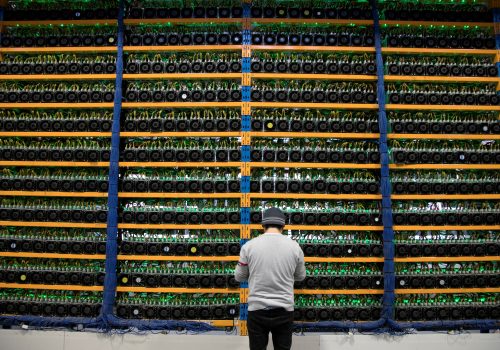Companies need to accurately collect and track operations data to increase efficiencies and reduce the carbon footprint of the oil & gas supply chain. In his Innovation Stream, Andrew Bruce argues that blockchain-powered data tracking ensures visibility, transparency, and accuracy and can be applied to the implementation of smart contracts and other efficiencies. He also discusses the role of blockchain technology in managing CO2 emissions, such as tracking the carbon footprint of the entire supply chain through supplier contracts and automating diesel delivery and consumption to report CO2 emissions.
Event recap
On April 16, 2020, the Atlantic Council Global Energy Center hosted the third installment in the new EnergySource Innovation Stream series. Building off the Global Energy Center’s EnergySource blog and soon-to-be-announced EnergySource podcast, EnergySource Innovation Stream highlights new energy technologies with the potential to reshape the global energy system through discussions with the companies and individuals working diligently to bring those innovations to market at scale.
The stream featured Andrew Bruce, chief executive officer of Data Gumbo, a Blockchain-as-a-Service (BaaS) company that helps companies in the energy sector and beyond automate transactions, monitoring, and reporting through its distributed ledger and smart contracts system. Randolph Bell, director of the Global Energy Center and Richard Morningstar chair for global energy security at the Atlantic Council, offered introductory remarks and moderated the discussion.
Bruce started the presentation with an overview of Data Gumbo’s origins: a data aggregation platform for oil and gas companies. He and his colleagues moved to expand the initial model following a conversation with a major oil company that was trying to improve drill pipe connection times. Bruce determined that the average connection time in the industry was six minutes, and that if the company could reduce its connection time by one minute, it would save $250 million a year. However, the aforementioned petroleum company could not gain traction on the matter because the drilling companies did not trust the oil producer to pay the bonuses associated with lower connection times. This predicament prompted Bruce to explore blockchain industrial applications for oil drilling and piping. Data Gumbo’s distributed ledger system, now called Gumbo Net, enabled oil and drilling companies to agree on a set of terms for the disbursement of bonuses or the incurment of penalties that could not be modified or misinterpreted by either party.
Since then, Data Gumbo has expanded its services beyond the oil and gas industry with the help of the Oil and Gas Blockchain Consortium. According to Bruce, Data Gumbo’s blockchain can be used to automate invoices, operating expenses, and even insurance, as well as conduct monitoring and reporting activities. Bruce also noted that the technology can track a company’s carbon footprint, monitor gas flaring to auto-pay penalties, and measure the efficiency and environmental impact of commercial operations.
In responding to a question about how Data Gumbo manages blockchain’s expansive system growth , Bruce noted that the company adapts blockchain technology to its specific industrial purposes. Data Gumbo uses large blocks to manage and store vast swaths of data on a chain and integrates the blockchain within the Internet of Things so that only authorized participants can view the transaction. The administrators and users of the specific blockchain maintain consensus on payment, monitoring, and/or reporting schedules and experience the same security, transparency, and usability of any blockchain network without the computational impositions of other blockchain applications like cryptocurrency.
Featuring

Mr. Bruce is chief executive officer of Data Gumbo. Andrew created Data Gumbo to realize billions of dollars in efficiencies across the industrial value chain. To accomplish this, Andrew is leveraging Data Gumbo’s proprietary blockchain, Internet of Things data platform and smart contracts to foster trust amongst counterparties, reduce barriers associated with doing business and reduce transaction time and cost. As a result, companies who use Data Gumbo’s platform will become more profitable and allow them to be recognized as an industry leader. Prior to Data Gumbo Mr. Bruce was chief operating officer for MHWirth, an Oil and Gas drilling solutions company, where he was responsible for global operations. While at National Oil well Varco (NOV), Andrew was the founder of the NOVOS project – a first-of-its-kind semi-autonomous drilling system – where Andrew holds a patent jointly on Rig Automation.
Related experts
Related content
Learn more about the Global Energy Center


The Global Energy Center develops and promotes pragmatic and nonpartisan policy solutions designed to advance global energy security, enhance economic opportunity, and accelerate pathways to net-zero emissions.



